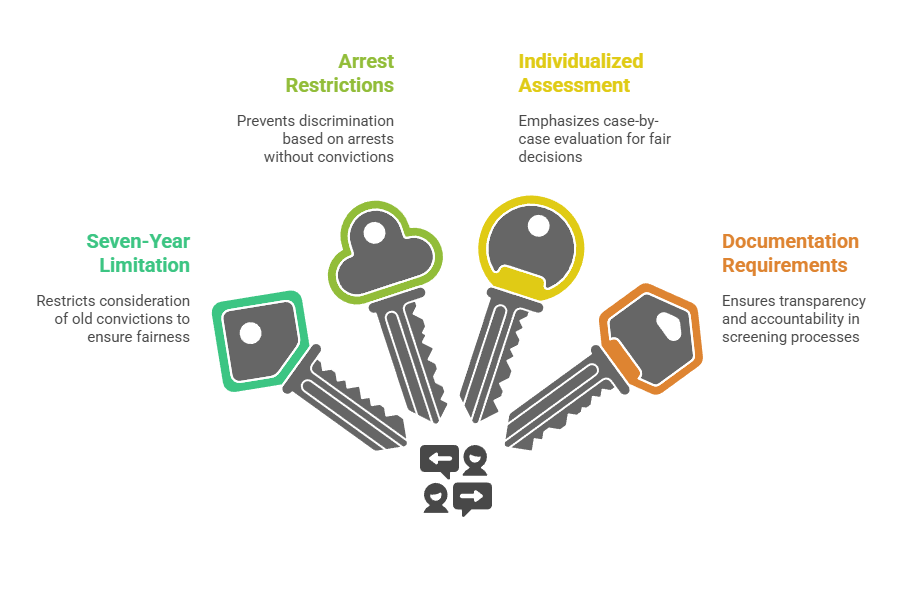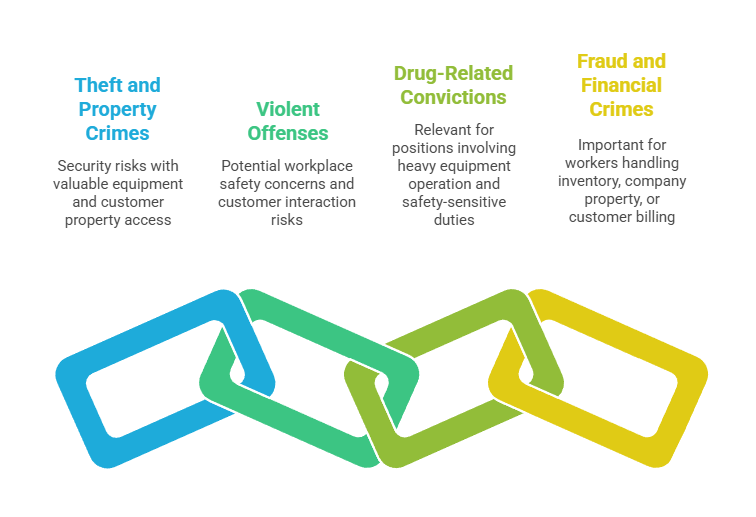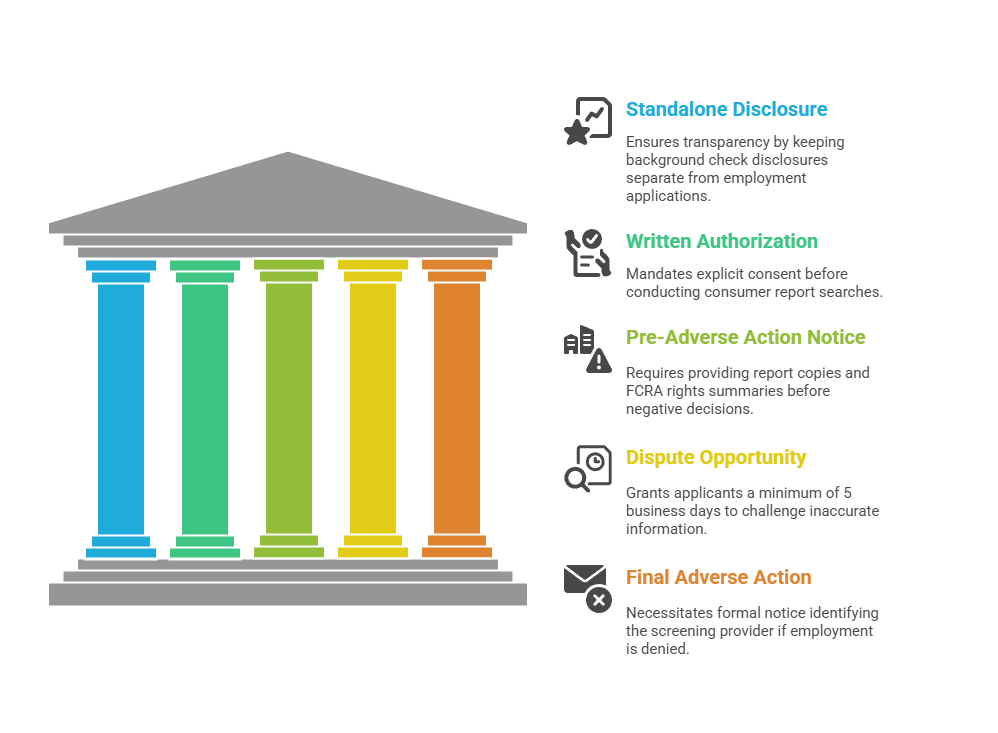Nevada's position as America's fastest-growing solar market—with over 13,000 MW of installed capacity and expanding utility-scale projects—has created unprecedented demand for comprehensive background screening protocols that address state licensing requirements, federal energy infrastructure security standards, and liability protection. Solar contractors operating in Nevada must navigate a complex landscape where proper workforce vetting directly impacts project insurance eligibility, OSHA compliance, state contractor licensing, and protection against catastrophic liability exposure from incidents involving workers with undisclosed criminal histories or substance abuse issues on high-voltage installations.
Key Takeaways
- Nevada solar contractors face mandatory background check requirements tied to C-2 electrical contractor licensing, with the Nevada State Contractors Board requiring disclosure of felony convictions and specific misdemeanors that affect licensing eligibility.
- The state's utility-scale solar projects, particularly those on federal land or connected to critical energy infrastructure, require additional FBI fingerprint screening and security clearances beyond standard employment checks.
- Comprehensive screening protocols must include criminal history searches (7-year lookback period per FCRA guidelines), motor vehicle records for installers operating company vehicles, and drug testing programs that comply with Department of Transportation standards for relevant positions.
- Nevada's solar industry growth rate of 47% annually since 2020 has intensified competition for qualified workers, making efficient background screening processes essential to maintain project timelines while ensuring safety compliance.
- Liability insurance carriers increasingly require documented background screening policies, with premiums potentially increasing 15-30% for contractors lacking formal vetting procedures after industry incidents involving unscreened workers.
- Nevada employers must balance thorough screening with FCRA compliance and state fair hiring laws, ensuring individualized assessments of criminal records rather than blanket exclusions that could trigger discrimination claims.
- Solar panel installation workers handling high-voltage systems (600V+) represent elevated risk categories where inadequate screening has resulted in documented incidents causing project shutdowns, worker injuries, and multimillion-dollar liability claims.
- Best-practice screening programs integrate continuous monitoring for existing employees working on long-term projects, addressing the reality that criminal activity or license suspensions can occur after initial hiring.
Understanding Nevada's Solar Industry Screening Landscape
Nevada has emerged as a powerhouse in America's renewable energy transition. The state ranks fifth nationally for installed solar capacity with over 5,800 MW of operational utility-scale facilities as of 2025. Nevada's abundant solar resources, favorable regulatory environment through Nevada Revised Statutes Chapter 701B, and aggressive Renewable Portfolio Standard requiring 50% renewable energy by 2030 have catalyzed explosive industry growth. This expansion has created thousands of construction and installation jobs, but it has also elevated the stakes for proper workforce screening.
Major utility-scale projects like Gemini Solar (690 MW) and Battle Mountain Solar (275 MW) require hundreds of specialized workers. The Las Vegas and Reno metropolitan areas have seen particularly rapid solar development in these large installations. These massive projects involve high-voltage electrical systems, elevated work platforms, and access to critical energy infrastructure. Such conditions create safety and security needs that make comprehensive background checks non-negotiable for responsible contractors.
Nevada's Unique Solar Market Position
Nevada solar contractor background checks serve three critical functions in this expanding market. First, they ensure worker competency and safety qualifications. Second, they protect energy infrastructure security. Third, they maintain regulatory compliance across multiple jurisdictions.
Unlike general construction, solar installation combines electrical work requiring C-2 licensing oversight with potential access to utility grid connection points classified as critical infrastructure. Work in this sector also involves workplace safety considerations unique to photovoltaic systems. The Nevada State Contractors Board maintains strict oversight of licensed contractors, with background investigations forming part of initial licensing and renewal processes. However, individual worker screening remains the responsibility of employing contractors.
Safety and Compliance Intersection
Contractors who fail to implement adequate screening face exposure on multiple fronts. State licensing sanctions represent one risk. Insurance policy violations create another concern. OSHA citations following incidents can result in significant penalties. Civil liability for negligent hiring poses perhaps the greatest financial threat.
This compliance framework means proper due diligence protects both public safety and business interests. One Nevada solar contractor faced a $2.3 million judgment in 2023 after an installer with undisclosed theft convictions stole customer equipment. This case highlights the financial consequences of screening failures and demonstrates why comprehensive vetting has become industry standard practice.
State Licensing and Regulatory Requirements
The Nevada State Contractors Board requires all C-2 electrical contractors—the classification covering solar photovoltaic installation—to undergo background investigations as part of licensing. Nevada Revised Statutes 624.260 mandates disclosure of felony convictions and specific misdemeanors. The Board evaluates whether criminal history demonstrates lack of fitness for licensed contracting work.
Convictions involving fraud, theft, financial crimes, or violent offenses receive particular scrutiny during license application reviews. For 2025, the licensing background check includes fingerprint-based searches through both Nevada criminal repositories and FBI databases. This provides nationwide coverage of criminal records.
C-2 License Background Requirements
License holders must disclose subsequent arrests or convictions within 30 days of occurrence. This creates ongoing compliance obligations throughout the license period. State-level screening establishes baseline requirements but doesn't address individual worker vetting—a gap that exposes contractors to significant liability if employees with problematic histories cause incidents on job sites.
Nevada doesn't mandate universal background checks for all solar installation workers. However, multiple regulatory frameworks create de facto requirements for responsible contractors. OSHA's general duty clause (Section 5(a)(1)) requires employers to provide workplaces free from recognized hazards. Courts have interpreted this to include proper hiring practices that screen out workers whose histories suggest safety risks.
Federal Security Standards for Solar Workers
Workers requiring access to utility substations or interconnection facilities face additional screening under NERC Critical Infrastructure Protection standards. These federal requirements, enforced through utility contracts, mandate background checks and security awareness training for personnel accessing bulk electric system facilities.
Solar contractors should verify specific access requirements with utility partners early in project planning. Doing so prevents delays when workers fail security clearances. The verification process typically takes 30-60 days for NERC CIP compliance, so advance planning proves essential for maintaining project schedules.
Nevada Fair Hiring Laws
Nevada labor law balances employer screening rights with worker protections against discrimination. Assembly Bill 236, effective since 2020, establishes important parameters for criminal history consideration:

- Seven-Year Limitation: Prohibits consideration of convictions more than seven years old (with exceptions for specific serious offenses)
- Arrest Restrictions: Prohibits employers from inquiring about arrests not leading to conviction
- Individualized Assessment: Requires case-by-case evaluation of criminal history rather than blanket exclusions
- Documentation Requirements: Mandates employers document legitimate business reasons for screening decisions
These fair hiring provisions don't eliminate screening obligations—they establish proper procedures. Solar contractors must document legitimate business reasons for background checks such as safety, security, licensing, and insurance requirements. Properly structured screening programs satisfy both risk management needs and legal compliance requirements.
Essential Components of Solar Contractor Background Checks
Comprehensive criminal background checks form the foundation of solar contractor screening programs. Best practices include county-level criminal searches covering the applicant's residence locations for the past seven years. These should be supplemented by multi-state database searches and federal court records for projects involving federal property or critical infrastructure access.
Nevada's county court systems maintain criminal records through individual district courts. Direct searches in jurisdictions like Clark County (Las Vegas) and Washoe County (Reno) prove necessary since most solar activity concentrates there. The seven-year reporting limitation under FCRA Section 605(a)(5) establishes the standard lookback period.
Criminal History Search Protocols
Solar contractors should focus criminal history reviews on offenses directly relevant to job responsibilities. The evaluation process should prioritize several key offense categories that impact workplace safety and security:

- Theft and Property Crimes: Indicate security risks with valuable equipment and customer property access
- Violent Offenses: Suggest potential workplace safety concerns and customer interaction risks
- Drug-Related Convictions: Relevant for positions involving heavy equipment operation and safety-sensitive duties
- Fraud and Financial Crimes: Important for workers handling inventory, company property, or customer billing
Positions with salaries exceeding $75,000 may permit longer searches under federal law beyond the standard seven-year period. This proves particularly relevant for project managers and supervisory roles in large utility-scale installations.
Motor Vehicle Record Verification
Solar installation frequently requires workers to operate company vehicles between job sites. They transport equipment and drive to remote utility-scale project locations. Motor vehicle record (MVR) checks verify license validity, identify serious violations like DUI convictions or reckless driving, and reveal patterns of unsafe operation.
Nevada Department of Motor Vehicles records provide three-year driving histories. These show moving violations, license suspensions, and accident involvement. Insurance carriers typically require MVR checks for all employees operating company vehicles, with specific violation thresholds triggering driving privilege restrictions.
Drug and Alcohol Testing Programs
The solar industry's safety-sensitive work environment makes substance abuse screening essential for accident prevention. Work in this field involves electrical systems, elevated platforms, and heavy equipment. Nevada legalized recreational marijuana in 2017, but employers retain the right to maintain drug-free workplace policies and test for cannabis, particularly for safety-sensitive positions.
| Testing Type | Application | Timing |
| Pre-Employment Screening | All safety-sensitive positions | Before work commencement |
| Random Testing | Workers handling high-voltage systems | Ongoing per written policy |
| Post-Accident Testing | Following any incident with injury or property damage | Immediately after incident |
| Reasonable Suspicion | When supervisors observe impairment indicators | As circumstances warrant |
| Return-to-Duty | Employees completing substance abuse treatment | Before reinstatement |
Pre-employment drug screens typically test for marijuana, cocaine, amphetamines, opiates, and PCP using Department of Transportation's 5-panel protocol. Expanded panels may include additional substances based on employer policy. Nevada contractors must establish clear written policies communicated during hiring and posted prominently at work sites.
Professional Credential Verification
Solar photovoltaic installation requires specific technical competencies verified through professional licensing and certifications. Nevada C-2 electrical contractors must verify that electricians hold appropriate state licenses—journeyman or master electrician credentials from the Nevada State Contractors Board.
Verification confirms licenses are active and unrestricted. Additionally, specialized solar certifications from organizations like the North American Board of Certified Energy Practitioners (NABCEP) indicate advanced training. These should be verified through direct contact with issuing bodies rather than accepting certificates at face value.
Special Considerations for Utility-Scale Projects
Large-scale solar facilities interconnecting with transmission infrastructure or located on Bureau of Land Management property face enhanced security requirements. The North American Electric Reliability Corporation (NERC) Critical Infrastructure Protection (CIP) standards mandate personnel risk assessments for workers with physical or electronic access to bulk electric system facilities.
CIP-004-6 specifically requires background investigations. These include seven-year criminal history checks, Social Security number verification, and identity validation. Solar contractors bidding utility-scale projects should clarify security requirements during contract negotiations.
Federal Clearance Processing Requirements
Clearance processing can require 30-60 days, and worker denials create project staffing challenges. Some utilities require Transportation Worker Identification Credential (TWIC) cards for workers accessing facilities near ports or intermodal transportation. TWIC adds another screening layer with its own timeline and cost implications.
Contractors should budget additional time and costs for enhanced screening when pursuing projects with federal security components. Investing in proper clearance processing prevents costly delays when projects begin and workers are denied facility access due to incomplete security vetting.
Insurance and Bonding Considerations
Commercial general liability insurance and contractor license bonds required for Nevada solar work increasingly incorporate background screening requirements within policy terms. Insurance carriers assess contractor risk profiles when establishing premiums and coverage limits. Documented screening policies reduce perceived risk and can lower insurance costs.
Following several high-profile incidents industry-wide involving workers with criminal histories causing theft or safety violations, carriers now frequently require attestation of background check policies as coverage conditions. Liability exposure from negligent hiring claims creates additional incentive for comprehensive screening. Nevada courts recognize negligent hiring as an independent cause of action, with plaintiffs successfully arguing employers failed due diligence when workers with accessible criminal records commit foreseeable harmful acts.
Multi-State Compliance Challenges
Solar contractors working across state lines face complex compliance requirements as background check laws vary significantly between jurisdictions. Nevada-based contractors pursuing projects in California must comply with California's Fair Chance Act prohibiting criminal history inquiries until conditional employment offers. Arizona projects require compliance with that state's fingerprint clearance card system for certain workers.
Multi-state operators need flexible screening protocols accommodating different state laws while maintaining consistent safety and security standards. The interstate nature of utility-scale solar construction requires portable screening results and ongoing monitoring. Contractors should implement continuous monitoring programs that alert HR departments to new criminal activity, license suspensions, or driving violations affecting existing employees between project assignments.
Implementing Compliant Screening Programs

The Fair Credit Reporting Act establishes federal requirements for employment background checks conducted through third-party consumer reporting agencies. Nevada solar contractors must provide clear written disclosure that background checks will be conducted. They must obtain written authorization before screening and provide pre-adverse action notices if information discovered may lead to employment denial.
Pre-adverse action processes require providing the applicant a copy of the background report. Employers also need to include a summary of FCRA rights and reasonable time (typically 5 business days) to dispute inaccuracies before final decisions. Common FCRA violations cost Nevada employers through statutory damages of $100-$1,000 per violation plus attorney fees.
FCRA Compliance Best Practices
Contractors should work with FCRA-compliant screening providers who understand technical requirements and structure processes to satisfy federal mandates. Key compliance elements include several critical procedural safeguards:

- Standalone Disclosure: Background check disclosure must appear on separate document, not embedded in employment applications
- Written Authorization: Obtain specific consent before initiating any consumer report searches
- Pre-Adverse Action Notice: Provide report copy and FCRA rights summary before making negative decisions
- Dispute Opportunity: Allow minimum 5 business days for applicants to challenge inaccurate information
- Final Adverse Action: Send formal notice identifying screening provider if employment is denied
Class action litigation represents significant exposure for FCRA violations. Technical compliance with disclosure and authorization requirements protects contractors from costly legal challenges while maintaining necessary screening rigor.
Individualized Assessment Requirements
Nevada AB 236 and EEOC guidance require individualized assessments when criminal history is identified. This means no automatic exclusions based on conviction alone. Each assessment should evaluate three specific factors in each case.
First, consider the nature and gravity of the offense. Second, evaluate time elapsed since conviction or completion of sentence. Third, assess the nature of the job sought and relationship between conviction and job duties. For solar installation positions, theft convictions directly relate to security concerns with valuable equipment access. However, decade-old DUI convictions show limited relevance to current installation work.
| Assessment Factor | Considerations | Documentation Required |
| Offense Nature | Type of crime, circumstances, severity | Court records, disposition details |
| Time Elapsed | Years since conviction, sentence completion, probation status | Sentencing documents, probation records |
| Job Relevance | Direct relationship to duties, security implications | Job description, risk assessment |
Documenting individualized assessments protects against discrimination claims while maintaining safety standards. Each assessment should consider evidence of rehabilitation—completion of probation, character references, employment stability since the conviction. Structured decision matrices help ensure consistency while allowing case-by-case evaluation.
Written Policy Development
Effective screening programs require written policies documenting procedures, position-specific requirements, and decision criteria. Nevada solar contractors should develop comprehensive background check policies covering all essential elements. Policies should specify positions subject to screening (typically all installation and electrical workers). They must define check components for each position level and establish acceptable and unacceptable criminal history by offense type.
Policy documentation serves multiple purposes beyond mere compliance. It communicates expectations to applicants and employees clearly. Consistent application across hiring managers becomes easier with written guidelines. Good-faith compliance efforts gain demonstration if legal challenges arise. Finally, insurance carrier requirements for documented screening protocols receive satisfaction.
Best Practices for Nevada Solar Contractors
Nevada solar contractors should engage professional screening providers specializing in FCRA-compliant employment background checks rather than attempting in-house processes. Quality providers offer several distinct advantages. They provide access to comprehensive databases and direct court searches. Technical infrastructure ensuring FCRA compliance documentation comes standard. Expert guidance on Nevada-specific legal requirements helps navigate complex rules. Faster turnaround times through established relationships with record sources accelerate hiring.
When evaluating screening providers, contractors should assess multiple capability areas. FCRA compliance certifications and procedures prove essential. Nevada court search coverage including direct county access for Clark and Washoe counties ensures thoroughness. Turnaround time commitments (72-96 hours typical for standard checks) affect project staffing speed.
Screening Provider Selection Criteria
The Professional Background Screening Association (PBSA) accreditation indicates providers meeting industry standards for compliance and quality. Additional evaluation factors include customer support availability for urgent project needs, technology platform integration with applicant tracking systems, and pricing transparency including revision costs for common searches.
Contractors should request client references from other Nevada construction or energy companies. Reviewing sample reports helps assess information quality and presentation. Testing customer service responsiveness before committing to provider relationships proves wise, as urgent project needs often require quick responses to screening questions or expedited processing requests.
Timing and Workflow Integration
Screening timing significantly impacts project staffing efficiency. Best practice involves conducting background checks after conditional employment offers but before work commencement. This approach protects both candidate experience and contractor interests by screening only serious candidates.
For fast-moving solar projects with immediate staffing needs, contractors should communicate expected timelines. Standard checks typically require 3-5 business days. Positions requiring federal security clearances take longer. Workflow integration should include online application systems collecting necessary authorization and disclosure documents, automated status tracking providing visibility into screening progress, and clear communication protocols informing candidates of timeline expectations.
Continuous Monitoring Implementation
Background screening shouldn't end at hiring—ongoing monitoring identifies issues arising during employment that affect safety or security. Continuous monitoring services alert employers to new criminal charges, convictions, or license actions affecting current employees. For solar contractors with multi-year utility-scale project commitments, continuous monitoring prevents situations where long-term workers develop disqualifying issues mid-project without employer knowledge.
Implementing continuous monitoring requires updating background check authorization forms to include ongoing search consent. Contractors must establish internal procedures for reviewing and responding to alerts. Documenting actions taken when disqualifying information appears protects all parties. This approach particularly benefits contractors managing large seasonal workforces who return annually for peak installation periods.
Addressing Common Challenges and Concerns
Nevada's competitive solar market creates pressure for rapid hiring to meet aggressive project schedules. This urgency sometimes conflicts with comprehensive screening requiring several days for complete results. Contractors can address this tension through several proven strategies.
Maintaining relationships with screening providers offering expedited services helps reduce turnaround time. Building candidate pipelines before critical need periods ensures pre-screened workers are available when projects begin. Rolling hiring processes that screen continuously rather than in batches prevent bottlenecks. Clear expectations with project managers about realistic onboarding timelines prevent unrealistic staffing commitments.
Speed Versus Thoroughness Balance
For truly urgent situations, contractors might consider conditional starts with enhanced supervision. This allows workers to begin non-sensitive tasks while background checks complete, with immediate removal if disqualifying information appears. Conditional arrangements carry risk and should be reserved for exceptional circumstances with appropriate safeguards.
Restrictions should include limiting access to valuable equipment, maintaining close supervision, excluding high-voltage work, and documenting the business necessity justifying conditional placement. Such conditional arrangements should never extend to positions requiring federal security clearances or utility facility access, where clearance completion remains mandatory before any work begins.
Applicant Experience Management
High-growth solar markets like Nevada generate substantial applicant volume, creating administrative challenges for thorough screening. Contractors should implement technology solutions streamlining the process while maintaining candidate engagement. Applicant tracking systems with integrated background check ordering reduce manual processing time. Mobile-friendly authorization document completion accommodates workers applying from smartphones. Automated status communications reduce applicant inquiry volume and demonstrate professionalism.
Clear communication throughout the screening process reduces applicant anxiety and dropout rates. Best practices include setting expectations about typical timelines during interviews, providing status updates at key milestones, explaining what information is evaluated and why, and offering opportunities to discuss potentially disqualifying findings before final decisions.
Dispute Resolution Procedures
Applicants sometimes dispute background check information, requiring contractors to follow specific FCRA procedures. When disputes arise, employers must provide reasonable opportunity for correction—typically pausing hiring decisions while the screening provider investigates with original record sources. Re-investigations usually complete within 30 days, though urgent situations may receive expedited treatment.
Nevada contractors should maintain documentation of dispute handling. Records should include dates of notices provided, information disputed, investigation results, and final decisions. Adverse action notifications require specific content under FCRA: identification of the screening provider (including contact information), a copy of the background report, notice of the adverse decision, and a summary of FCRA rights. Nevada AB 236 adds state-level requirements for pre-disqualification notices explaining the criminal history basis and opportunity to respond.
Conclusion
Nevada solar contractor background checks represent essential due diligence in America's fastest-growing renewable energy market. Proper workforce vetting directly impacts project safety, regulatory compliance, liability protection, and business reputation. The state's unique position—combining explosive solar growth with complex regulatory frameworks spanning state contractor licensing, federal energy infrastructure security, and industry-specific safety requirements—makes comprehensive screening non-negotiable for responsible contractors. By implementing best-practice programs that balance thoroughness with legal compliance, Nevada solar employers protect both their workers and their businesses while contributing to the state's clean energy future.
Frequently Asked Questions
What criminal offenses disqualify someone from solar installation work in Nevada?
Nevada doesn't maintain a specific list of automatically disqualifying offenses for solar workers, but the State Contractors Board evaluates felonies and specific misdemeanors during C-2 license applications. Employers establish their own standards within legal limits, typically focusing on theft crimes for equipment access positions, violent offenses for customer-facing roles, and drug offenses for safety-sensitive positions. Nevada AB 236 requires case-by-case assessment rather than blanket exclusions, evaluating offense nature, time elapsed, and job relevance before disqualification decisions.
How long do background checks take for Nevada solar contractors?
Standard employment background checks for Nevada solar positions typically complete within 3-5 business days when using professional screening providers with direct access to Clark and Washoe County court systems. Checks requiring federal security clearances for utility-scale projects involving critical infrastructure access may require 30-60 days for NERC CIP compliance processing. Delays occasionally occur when candidates have lived in multiple jurisdictions requiring searches in counties with slower record access. Expedited services offering 24-48 hour turnaround are available at premium pricing for urgent staffing needs.
Do Nevada solar employers have to conduct background checks on all workers?
Nevada law doesn't mandate universal background checks for solar installation workers, but practical requirements emerge from multiple sources. The State Contractors Board requires background investigations for C-2 license holders, insurance policies frequently require documented screening protocols, utility contracts mandate NERC CIP security clearances for critical infrastructure access, and OSHA obligations create liability exposure for failing to screen safety-sensitive positions. While not technically mandatory for every worker, comprehensive screening represents industry best practice and risk management necessity for responsible Nevada solar contractors.
Can Nevada solar contractors reject applicants for marijuana use?
Yes, Nevada employers retain the right to maintain drug-free workplace policies and reject applicants testing positive for marijuana despite state legalization of recreational cannabis. Nevada Revised Statutes 678D.500 prohibits refusing employment based solely on positive marijuana tests, but includes important exceptions: the law doesn't apply to positions affecting safety of others or positions requiring driving as essential functions. Solar installation workers handling high-voltage electrical systems and operating company vehicles clearly fall within these safety-sensitive exceptions.
What's the difference between county criminal searches and state database checks?
County-level criminal searches access official court records directly from the specific county where offenses were prosecuted, providing the most accurate and complete information including case details, dispositions, and sentence completion status. State database searches query centralized repositories maintained by state agencies, offering broader geographic coverage but potentially missing records not yet reported to state systems. Nevada doesn't maintain a comprehensive statewide criminal repository accessible for employment screening, making county-level searches in jurisdictions where candidates lived essential for thorough background checks.
How do continuous monitoring programs work for existing solar workers?
Continuous monitoring services conduct ongoing searches of criminal records, sex offender registries, and professional license databases for current employees who provided consent during hiring. When new records appear—arrests, convictions, license suspensions, or other specified events—the monitoring service alerts the employer, typically within 24-48 hours. Nevada solar contractors use continuous monitoring particularly for long-term utility-scale project workers and seasonal employees who return annually. Implementation requires updated authorization forms including ongoing search consent and clear policies explaining how alerts will be evaluated.
What FCRA requirements apply to Nevada solar contractor background checks?
The Fair Credit Reporting Act requires employers using third-party screening providers to provide clear written disclosure on standalone documents, obtain written authorization before conducting checks, provide pre-adverse action notice if background information may lead to employment denial, and allow reasonable time for candidates to dispute inaccuracies. Nevada solar contractors must follow these federal requirements plus additional Nevada state law provisions from AB 236 regarding case-by-case assessment of criminal records. Working with FCRA-compliant screening providers who structure processes according to technical requirements helps ensure compliance.
Do background check requirements differ between residential and utility-scale solar projects?
Yes, significantly. Residential solar installation background checks typically focus on criminal history relevant to customer home access, motor vehicle records for workers driving between sites, and verification of electrical licensing credentials. Utility-scale projects add substantial requirements: NERC CIP security clearances for bulk electric system facility access, potential TWIC credentials for facilities near transportation infrastructure, enhanced drug testing protocols for heavy equipment operators, and sometimes federal background investigations for projects on Bureau of Land Management property.
Additional Resources
- Nevada State Contractors Board - Licensing Requirements and Background Check Information
https://www.nscb.nv.gov/ - Fair Credit Reporting Act (FCRA) - Federal Trade Commission Guidance for Employers
https://www.ftc.gov/tips-advice/business-center/guidance/using-consumer-reports-what-employers-need-know - NERC Critical Infrastructure Protection Standards - Personnel Risk Assessment Requirements
https://www.nerc.com/pa/Stand/Pages/CIPStandards.aspx - Nevada Revised Statutes Chapter 624 - Contractors License Law
https://www.leg.state.nv.us/nrs/nrs-624.html - OSHA Safety and Health Topics - Solar Energy
https://www.osha.gov/green-jobs/solar - Professional Background Screening Association - Industry Standards and Best Practices
https://www.pbsa.org/ - North American Board of Certified Energy Practitioners - Solar Certification Verification
https://www.nabcep.org/ - Nevada Department of Employment, Training and Rehabilitation - Employment Law Resources
https://detr.nv.gov/

GCheck Editorial Team
Meet the GCheck Editorial Team, your trusted source for insightful and up-to-date information in the world of employment background checks. Committed to delivering the latest trends, best practices, and industry insights, our team is dedicated to keeping you informed.
With a passion for ensuring accuracy, compliance, and efficiency in background screening, we are your go-to experts in the field. Stay tuned for our comprehensive articles, guides, and analysis, designed to empower businesses and individuals with the knowledge they need to make informed decisions.
At GCheck, we're here to guide you through the complexities of background checks, every step of the way.





